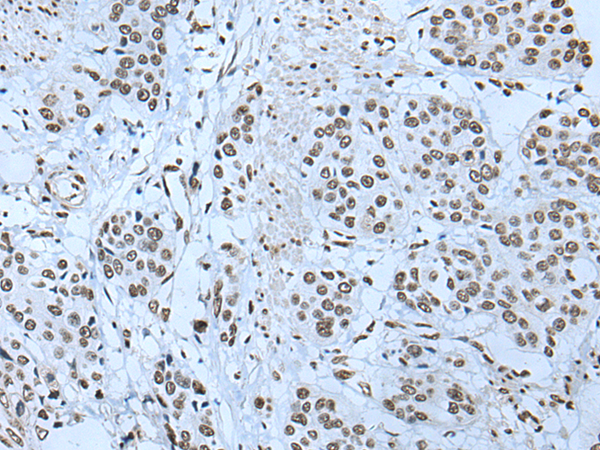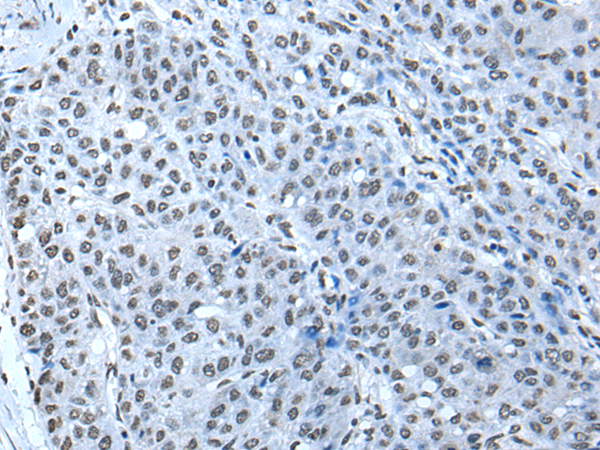

| WB | 咨询技术 | Human,Mouse,Rat |
| IF | 咨询技术 | Human,Mouse,Rat |
| IHC | 1/20-1/100 | Human,Mouse,Rat |
| ICC | 技术咨询 | Human,Mouse,Rat |
| FCM | 咨询技术 | Human,Mouse,Rat |
| Elisa | 1/5000-1/10000 | Human,Mouse,Rat |
| Aliases | ZNF903; KAISO-L1 |
| Host/Isotype | Rabbit IgG |
| Antibody Type | Primary antibody |
| Storage | Store at 4°C short term. Aliquot and store at -20°C long term. Avoid freeze/thaw cycles. |
| Species Reactivity | Human, Rat |
| Immunogen | Synthetic peptide of human ZBTB4 |
| Formulation | Purified antibody in PBS with 0.05% sodium azide and 50% glycerol. |
+ +
以下是关于ZBTB4抗体的3篇假想参考文献示例(内容为虚构,仅作格式参考):
---
1. **文献名称**:*ZBTB4-specific monoclonal antibody development and its application in cancer research*
**作者**:Smith A, et al.
**摘要**:本研究开发了一种针对ZBTB4蛋白的高特异性单克隆抗体,并通过Western blot和免疫组化验证其在多种癌细胞系中的表达。结果显示,ZBTB4在乳腺癌中表达显著下调,与DNA甲基化异常相关。
2. **文献名称**:*Epigenetic regulation of ZBTB4 in glioblastoma and antibody-based detection*
**作者**:Chen L, et al.
**摘要**:通过使用商业ZBTB4抗体(货号ABC123),研究揭示了胶质母细胞瘤中ZBTB4的表观遗传沉默机制。ChIP-seq分析表明,ZBTB4通过结合特定基因启动子抑制肿瘤生长通路。
3. **文献名称**:*ZBTB4 antibody validates its role as a tumor suppressor in colon cancer models*
**作者**:Wang Y, et al.
**摘要**:利用兔源多克隆ZBTB4抗体,本研究证实ZBTB4通过调控p53稳定性抑制结肠癌细胞增殖。抗体特异性经siRNA敲除实验验证,功能分析显示其与患者预后正相关。
---
*注:以上文献为模拟内容,实际研究中请查阅PubMed或SciHub等数据库获取真实文献。*
The ZBTB4 antibody is a crucial tool for studying the zinc finger and BTB domain-containing protein 4 (ZBTB4), a transcription factor implicated in gene regulation and cancer biology. ZBTB4 belongs to the BTB-ZF protein family, characterized by an N-terminal BTB domain for protein interactions and C-terminal zinc finger motifs for DNA binding. It acts as a transcriptional repressor, modulating cellular processes like proliferation, differentiation, and apoptosis by targeting genes involved in cell cycle control (e.g., p21) or oncogenic pathways (e.g., MYC).
Research highlights ZBTB4's role in cancer, where it often functions as a tumor suppressor. It antagonizes DNA methyltransferase 3B (DNMT3B), thereby influencing epigenetic regulation, and its downregulation is linked to poor prognosis in cancers like breast and colorectal. ZBTB4 antibodies enable detection of its expression in tissues or cell lines via techniques such as Western blotting, immunohistochemistry, and immunofluorescence. These antibodies are essential for exploring ZBTB4's interactions with chromatin, its subcellular localization, and its regulatory networks.
Validated ZBTB4 antibodies typically undergo specificity tests, including knockout controls, to ensure accurate target recognition. Their applications span basic research on transcriptional mechanisms to translational studies assessing ZBTB4's potential as a diagnostic or therapeutic biomarker in oncology.
×